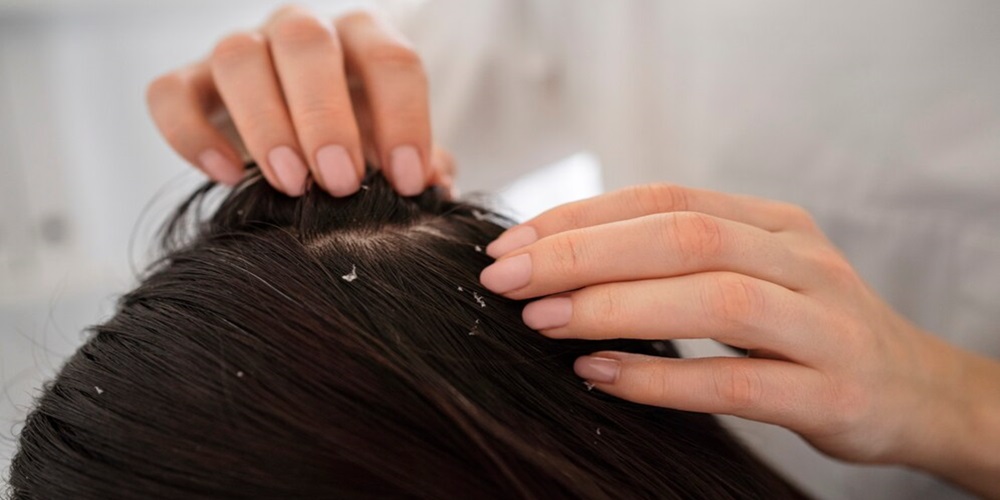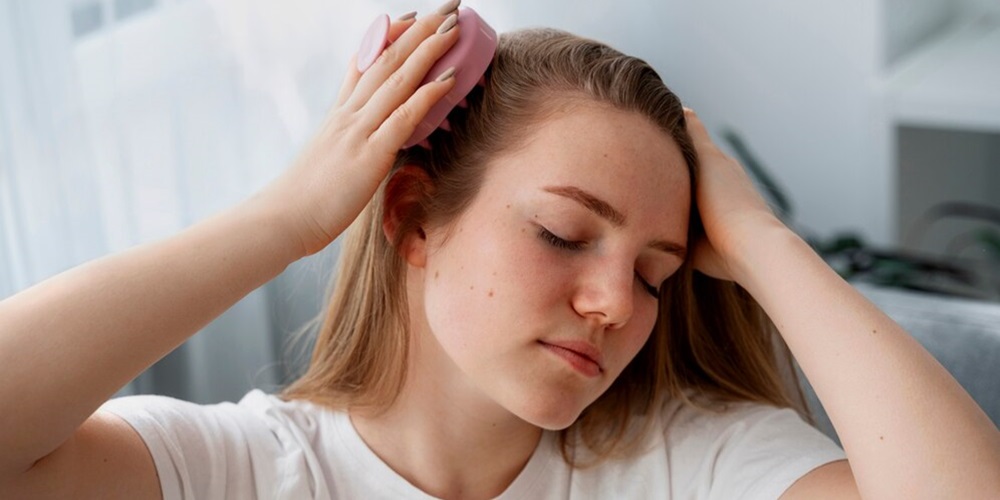Home » What is Scalp Eczema? Symptoms, Causes, and Treatment Options

Eczema on scalp is a skin condition, a form of eczema, that affects your scalp, parts of your face, and, at times, other areas of your body. It is also called seborrheic dermatitis and, in its mildest form, dandruff. Essentially, eczema is an inflammatory skin condition, variously known as dermatitis, marked by red, swollen, itchy skin. More individuals are afflicted with scalp eczema living in cities and towns than in more rural settings. It was noted that city dwellers, especially those with unrestricted side yards, were nearly two times more liable to suffer from eczema on scalp compared to rural areas.
As in other forms of eczema, eczema on scalp has a significant impact on the quality of life and the psychological well-being of the sufferer. The unremitting itch and development of painful weeping sores on the scalp may embarrass the sufferer. Frustration may set in if the individual tries treatment after treatment without seeing desired results. Milder cases of dandruff can crop up and resolve out of the blue throughout one’s life. On the other hand, some children and adults can suffer from reactive, inflamed seborrheic dermatitis of the scalp for years at a time—ever concerned that scratching an itch could trigger more flakes to form in the wind instead. Some people become so self-conscious about the look and feel of their scalp that they avoid social interactions, miss school, or suffer impaired work abilities due to decreased self-confidence associated with scalp eczema. Individuals who are most likely to experience a severe form of eczema on scalp may have the condition for life and first exhibit symptoms while they are still infants.
Scalp and hair problems are more common than you might think. Probably, the most general affliction is scalp eczema. Eczema is one kind of inflammatory condition of the skin, and it affects about 10-20% of the population in the whole world. It may appear on any part of your body where sebaceous glands excrete oil. The sebum can block the gland and thereby develop an eczema flare-up. It can also appear a little higher from the gland where the hair is growing; hence, its appearance on the scalp too. Eczema on scalp is chronic; there is no permanent cure for it, but there is a possibility of scalp eczema treatment to keep the scalp eczema symptoms under control. Scalp eczema presents with various symptoms and intensity. Symptoms vary and may range from mild to severe.
The first and foremost symptom of eczema on scalp is the appearance of redness over the scalp. This redness varies in intensity depending upon the proportion of the scalp affected. A small area of the scalp that has been red will become itchy. This itchiness varies in nature and intensity and may become severe if it increases in size. The increase in size is due to subsequent attacks. After a few days, the affected area will start developing flakes. The intensity, amount, and size of flakes vary depending on the impact of eczema on the scalp. If a large area is affected, the scalp might produce an excessive amount of flakes. These symptoms are due to the inflammation of the epidermis or the top cover of the scalp skin. Furthermore, these symptoms will become more intense during excessive peeling of the scalp. If eczema develops into a severe chronic condition, there will be intense dandruff formation with concomitant scalp and hair infection. Scalp eczema is chronic, and without treatment, the symptoms will last over a long period. The scalp eczema symptoms, especially the flaking, are most severe during the cold weather and in polluted environments. That is because, during cold weather, your body’s sweat pores close to minimize heat and energy loss, and the sweat excreted as a result. Sweat contains salt, and it is one of the factors responsible for the nourishment of bacteria, both eating the sweat and living under the moist environment sweat creates when it accumulates beneath the dead skin called the epidermis. The more sweat your body excretes, the more intense the eczema on scalp symptoms are. Infections that lead to the development of scalp eczema have various causes of scalp eczema and triggers.
The skin condition of eczema is primarily caused by an overactive immune response to allergies. Other triggers that cause of scalp eczema are chemicals, dry skin, sweat, strain, medications, infections, and severe weather conditions. Visibly noticeable scalp eczema symptoms have negative psychological effects on the social lives of sufferers. Scalp eczema sufferers are rather self-conscious and can withdraw socially because of the fear of people’s stares and possible comments. Furthermore, some people mistake scalp eczema symptoms for other scalp conditions because they could be multiple, and insoluble away. As a result, they do not receive the right scalp eczema treatment; thus, their problem is worsened. This condition calls for the soul of this pathology to be considered, recognizing it, especially identifying its scalp eczema symptoms to receive timely and effective treatments.

Scalp eczema is the result of a variety of different factors. For some patients, eczema (and other pesky skin conditions) can be a hereditary trait. The concept that excessive immune responses and difficulty restoring the skin’s natural barrier may be partly genetic is supported. The more likely an individual is to develop eczema, the more irritants, allergens, and foods in their environment or diet can tire out the overall condition of the skin. However, the odds of developing eczema on scalp are an equal mix of genetic influence and environmental influence. Additionally, sex hormones fluctuate through our bodies and also play a part in stress response variations. Pregnant women, like teenagers, often develop eczema suddenly simply due to hormonal changes.
Numerous events in our environment or lifestyles can trigger a scalp eczema flare-up. Among the culprits of this multifactorial skin condition, stress is one of the top contenders for the scalp eczema trigger of the year. Sweat represents a buildup of salt crystals, water waste, and minerals that have been deemed very irritating to broken or fissured skin, inducing stinging or burning sensations on the skin. Weather changes, particularly cold, dry climates, can shock and trigger or exacerbate scalp eczema, though the same can be said for very hot and humid climates. Some suggest that for people with especially oily skin, the lipophilic Malassezia yeast strain can change habitats and become hyphal when it senses the increase in triglycerides and free fatty acids. Certain lifestyle triggers may make a bad flare-up worse or kick off an eczema episode. Skin hygiene and dietary changes can also alter the microflora and skin barrier function, which may further perpetuate an eczematous environment. Reactions to particular foods or food groups, like dairy, may also play a role in the severity of eczema. Itchy, painful, flaky scalp matters can drive some to the end of their wits. The triggers behind this distressful condition are often just as important as how it is treated. Knowing why scalp eczema symptoms appear helps sufferers to not only be proactive and mitigate triggers but also avoid or decrease the frequency and severity of scalp eczema.
Scalp eczema is normally diagnosed by just looking at your scalp and taking a detailed account of your symptoms. Other scalp disorders can partially resemble eczema on scalp or contribute to worsening it; thus, sometimes additional testing may need to be done to rule out other potential causes of scalp eczema. These can include a hair shaft biopsy, a fungal culture, a patch test, or a scalp biopsy. Inside a dermatologist’s office, the doctor will take a clinical history and ask you about your hair and scalp eczema symptoms. The history often leads to the diagnosis, as symptoms are usually classic and familiar to a dermatologist who has treated patients with similar conditions. Usually, a doctor will want to perform an examination of the hair and scalp, and potentially a skin biopsy, blood work, patch test, fungal culture, or hair analysis.
Topical scalp eczema treatment includes corticosteroids, tacrolimus, or pimecrolimus, with the strongest ones used initially, especially for the weeping scalp. Those with recalcitrant or resistant scalp eczema, or those with the disease in a more severe form, may have to use even more powerful medication treatments, including those taken by mouth or through an injection. Antifungal medication and medicated shampoos can also be part of one’s scalp eczema treatment regimen, particularly when there is a fungal yeast component. Ongoing shampoos are usually a part of a person’s disease care as well as treatment for flares. The use of complementary or alternative therapy may be worth exploring, especially for people with mild disease, and lifestyle and behavior modification. The right treatment for a person depends on their individual needs and the judgment of a healthcare provider. Factors such as skin type and the severity of the symptoms may make one treatment more appropriate than another.
Preventative measures and lifestyle advice. Patients with scalp eczema should ideally use a mild hair care regimen. Hair should be washed regularly, often several times a week, with a shampoo that is mild enough to be used frequently. A conditioner will help to keep hair soft but the patient may have to avoid applying conditioner to the scalp if they find that it blocks their hair follicles. Of course, the best methods of scalp eczema treatment will always vary by individual. A diet with a balance of fresh fruits and vegetables helps support the skin; some foods have anti-inflammatory properties.
Whereas, for the people in whom stress acts as a major trigger for scalp eczema, the management of stress should be done by modification of life. Many people have taken up mindfulness or meditation as part of their daily or weekly schedule. Whereas a few others find the exercise-especially the mind-body exercises-helpful. As far as possible, avoid the triggers that may minimize outbreaks of scalp eczema. It is sometimes time-consuming as a few of these may not be identified easily. Management and scalp eczema treatment are heavily connected with management and treatment of the triggers. Trial and error, along with noting any relevant changes that a person may feel when they make changes to certain lifestyle factors, may give them more direct insight into what affects their scalp eczema. Whatever the exact causes of scalp eczema, there are also various lifestyle suggestions that can be easily followed when trying to minimize the consequences of a condition and avoiding its further new symptom activation. Naturally, every case of eczema on scalp is different, and such suggestions may need to be modified in accordance with a person’s specific needs.
Hello!